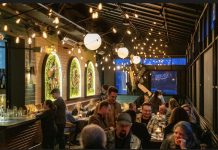
Last year during Ramadan, the Dearborn-based pharmacist Hassan Chami was driving down Warren Avenue, when he saw something peculiar. “People were setting up tents on the side of the road and selling food in the middle of the night,” Chami says. It gave him an idea. What if he planned a food festival that would start at midnight and end whenever the sun came up? This is the time of day Muslims are permitted to eat during their nearly month-long fast. He announced his plans, hoping a few dozen would attend. But his expectations were off — by a long shot. “Three days after I posted on Instagram, over 3,000 guests showed up to one of the greatest spontaneous events the city has seen.”
Late-night food festivities during Ramadan — the Muslim month of fasting, which begins on May 6 this year — have occurred in Dearborn for well over a decade. But until recently, they’ve been confined to homes, restaurants, and mosques. What made Chami’s event unheard of in the United States, was the scale of it. The streets spilled with food cart vendors, some selling shawarmas, others selling frozen yogurt, spaced with ample room for kids to play in plain view, all amidst the darkest hours of night. Elsewhere in the U.S., Muslims are often fearful about being too public about their faith. But the sheer density of Muslims in Dearborn has allowed residents to create a city-wide Ramadan culture that feels safe, inclusive, and joyous. At last year’s events, Chami estimates that a significant number of attendees were non-Muslims from all over metro Detroit who simply wanted to eat delicious food in the middle of the night.
It’s easy to become mesmerized by Dearborn, especially if you grew up like me: a Muslim-American without many other Muslims around. In the 1980s, my parents, both Indian Muslims born and raised in Tanzania, did their best to create a Ramadan culture in Sacramento, California. They took my siblings and I for late-night ice cream runs and stocked our freezer with halal burger patties. Most evenings, we broke our fast at home, given that the closest mosque was dozens of miles away. As a brown family in a white suburb, we did not want to draw undue attention to ourselves. What I always wanted was a place where fasting was the norm, not the exception — a place, basically, like Dearborn.
I first experienced Ramadan in Dearborn in 2007, when my sister was a student at the University of Michigan. Back then, Ramadan in Dearborn was not as festive as it is today. A few places served the nightly feast at the end of fasting known as the iftar. New Yasmeen Bakery was one of the only places open throughout the night. I remember standing in a long line with my sister at 4 a.m., waiting to order a za’atar-covered flat bread, joking with parents and children who were also about to start a day of fasting. Even though there were no midnight street fairs, there were Arabic signs, halal food options, and cashiers at restaurants who knew how to pronounce my name. For an 11-year-old from Sacramento, who would go days in Ramadan without seeing other Muslims, observing the holiday in Dearborn suddenly made me far less anxious about being a Muslim in public.
Today, each establishment has developed its own Ramadan culture. At Shatila — perhaps the most famous bakery in all of Dearborn and well known across the country — the peak hour is 6 p.m., when Muslims come in to buy sweets before they head off to iftar home parties across the city that happen every weeknight. Tania Shatila, whose father started the bakery in 1979, told me that, “items like kashta [filo dough filled with cream and rose water] sell the most in Ramadan.” Shatila estimates that most Dearborn residents still eat at home during Ramadan because of the allure of home cooking, but she added that the growing number of food festivals and late-night dining options is drawing more people out.
When I asked her — as well as other Dearborn residents — about their favorite Ramadan eateries, most said the question was too difficult to answer. That’s partly because the foods they love and crave after a long day of fasting are tied up with much more than what is on the plate. It is about the memories they have of the foods they, or their parents, ate back home in the Middle East, such as the Lebanese salad fattoush, which is served with tomatoes, cucumbers, pita, radishes, and sumac.
I experienced this myself late one night outside at a shawarma place on Warren Avenue. As a young Lebanese-Muslim-American customer was entering, I asked what drew him to that particular spot. He looked around to make sure no one was within earshot and then said, “Oh, there are much better shawarma places in Dearborn, but the owner is from my village and it’s basically like home.” I knew exactly what he was talking about.
Zahir Janmohamed is a graduate student of creative writing at the
University of Michigan and co-host of the James Beard Award finalist,
Racist Sandwich, a podcast about food, race, gender, and class.
Must-Visits During Ramadan
New Yasmeen Bakery
Stop in for freshly baked pita bread, hearty sandwiches, desserts, and more.
13900 W. Warren Ave.
Cedarland Restaurant
Pop by for classic Middle Eastern dishes and drinks.
13007 W. Warren Ave.
Zo’s Good Burger
Try the halal burgers and crispy fries.
14311 Michigan Ave.
Sheeba
Indulge in authentic
Yemeni cuisine.
13919 Michigan Ave.
Iraqi Kabob
Visit this low-key spot known for its grilled meat skewers.
13650 W. Warren Ave.
|
|
|











